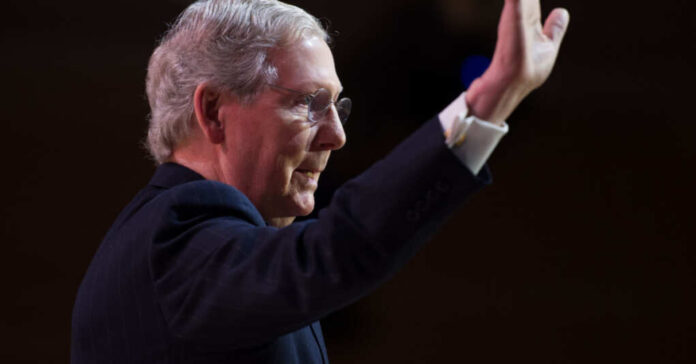
Fresh on the heels of a contentious battle to replace House Speaker McCarthy, Republicans face a new challenge following Mitch McConnell’s decision to step down as a Senate GOP Leader in 2024.
Mitch McConnell’s political journey began with an internship under Senator John Sherman Cooper in 1964. Later, he worked as a legislative assistant to Senator Marlow Cook between 1968 and 1970. His academic background also included teaching political science at the University of Louisville. In 1974, McConnell returned to Washington as Deputy Assistant Attorney General under President Gerald Ford.
McConnell’s impact extended beyond the national stage. He held the Jefferson County Judge/Executive position in Kentucky from 1977 to 1984. In 1984, he was elected to the U.S. Senate, becoming the senior senator from Kentucky. Notably, McConnell became the second Kentuckian to serve as a party leader in the Senate.
Influential leadership roles marked McConnell’s tenure in the Senate. He assumed the role of Senate Minority Leader in 2021, following his previous stint as Senate Majority Leader from 2015 to 2021. His longevity in these positions earned him the distinction of being the longest-serving Senate party leader in U.S. history, having led the Senate Republican Conference since 2007.
Throughout his career, McConnell adeptly navigated ideological shifts within the Republican Party. From traditional conservatism to the populism associated with former President Donald Trump, he adapted to changing tides. However, his relationship with Trump became strained when he refused to endorse Trump’s claims about the 2020 election results.
His announcement is another headache for Republicans who only just finished a contentious battle to replace former House Republican Speaker Kevin McCarthy after his ouster on October 3, 2023. McCarthy, who had the dubious distinction of being the first House Speaker in history ever voted out, faced opposition within his party for many reasons, including a highly contested budget bill.
Representative Matt Gaetz of Florida called for the vote to “vacate the chair” following the passage of the budget bill, which conservatives believed violated the commitments McCarthy made to secure the role of House Speaker. With the House in turmoil and the risk of a looming government shutdown, McCarthy made several critical concessions against his party’s wishes to pass a bill to keep the government open.
After this, many Republicans felt that McCarthy could not be trusted, and there was a shared sense by both Democrats and Republicans that McCarthy’s commitments were unreliable. McCarthy’s inability to navigate these challenges eroded confidence in his leadership.
Mike Johnson, a relatively little-known Republican congressman from Louisiana, emerged as the new House Republican Speaker after weeks of contentious debate. Johnson’s nomination came after three previous candidates failed to secure support, including Jim Jordan (R-OH).
Johnson’s election as House Speaker was not an easy choice for Republicans. Johnson, a constitutional lawyer, crafted arguments supporting Donald Trump following the 2020 election. His theories centered on changes in certain states’ voting procedures during the pandemic, which he deemed unconstitutional.
Now, Republicans are facing another vacuum in leadership. While no official announcements have been made, three senators are widely regarded as the top contenders to succeed McConnell.
Mitch McConnell’s current second-in-command, John Thune (SD), emerges as a likely candidate. His role as the Republican whip emphasizes his influence within the party, and his reputation as a moderate could prove crucial in balancing the competing wings of the Republican Party and add to his appeal for Democrats.
John Barrasso (WY) holds a significant position as the Republican Conference Chair. His unwavering support for former President Donald Trump has never wavered, earning him credibility among fellow Republicans. Barrasso’s alignment with Trump’s policies positions him as a strong contender.
John Cornyn (TX) brings leadership experience to the race, having served in the Senate for years. His endorsement of Trump’s agenda makes him another potential candidate. His close ties to Mitch McConnell may also play a role in his candidacy.
Looking ahead, McConnell announced that he will step down as the Senate Republican Leader in November 2024. Despite this transition, he intends to complete his Senate term, which concludes in January 2027.
At 82, McConnell calls the opportunity to lead his Republican colleagues the honor of his life but added, “One of life’s most under-appreciated talents is to know when it’s time to move onto life’s next chapter.”
It’s a talent that many politicians, including the President, don’t seem to have.















